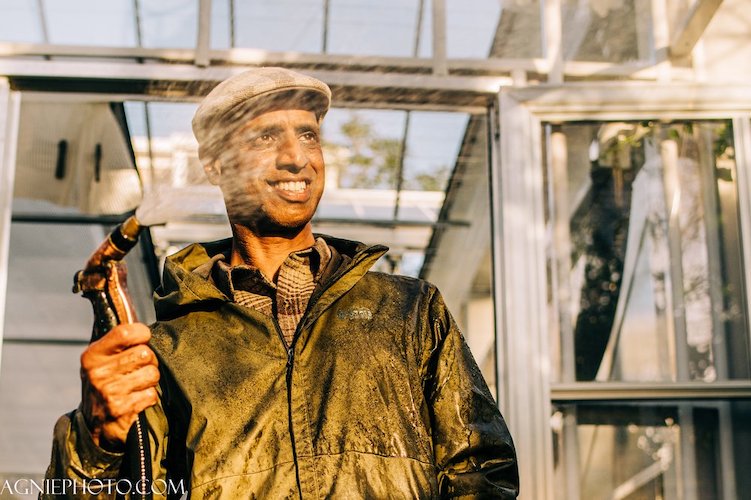
Kannan Thiruvengadam is director of Eastie Farm, a community farm and educational center. Here he prepares to water plants at the farm's geothermal greenhouse. Photo: Eastie Farm
When Kannan Thiruvengadam and Monica Leitner-Laserna stumbled on an empty, overgrown plot of land in their East Boston neighborhood in 2015, they had a sudden vision.
Why not turn the weed-choked, trash-filled lot into a community farm?
It might have seemed a stretch to some. East Boston has always been known as a vibrant, tight-knit community that has welcomed waves of immigrant communities over the decades, from Irish and Italian families in the early 20th century to Latino immigrants more recently. It is also known for noisy jet traffic from Logan Airport, state highway 1A splitting the neighborhood in two, and assorted tanks storing jet fuel and heating oil. It is not a place where most people imagine a lush garden filled with herbs, greens, and garlic.
But that’s exactly what happened when a dozen volunteers joined forces to grow food in an enterprise that would become Eastie Farm, a community farm and educational center which has expanded to include seven plots of land, one housing what is perhaps the state’s first geothermally powered greenhouse. At the farm, locals can buy fresh produce and school students can nurture plants while learning about sustainable practices like rainwater conservation, composting, food waste management, and renewable energy.
“The work on food is important because food security is important and we happen to be in a community where there is food insecurity,” says Thiruvengadam, director of Eastie Farm. (East Boston is considered an environmental justice community where about two-thirds of residents identify as a race or ethnicity other than white. About one-third of residents are non-U.S. citizens.) “Food is a way you can engage with all people, and it’s a powerful vehicle for building trust, building connections, and building community.”
Thiruvengadam says the Legal Food Hub played a critical role in Eastie Farm’s formation when it helped him acquire two city-owned plots of land. One of these plots has become a key distribution point for Eastie Farm, which supports local farmers by buying their produce. That produce is then either sold or given away to people in need. Hundreds of families across all income levels pick up produce each week.
Through the Hub, Thiruvengadam was connected to Anderson & Krieger LLP, the Boston law firm that helped him with the transfer of the city-owned property. It can be risky, he says, to forgo legal counsel.
He offers as an example the conveyance of Eastie Farm’s plot at 6 Chelsea Terrace. Anderson & Krieger pointed out that in the deed transfer, the city had removed the possibility of constructing any structure on the land.
“And they said, no, you’ve got to get some structures in there, otherwise it’s going to be useless to you,” recalls Thiruvengadam. “And so, that was good advice and that’s why we have the structures we have now.”
Since that time, Eastie Farm has reached out to the Legal Food Hub on several other occasions. Knowing he can get expert free legal advice when he needs it comes as an enormous relief.
“I feel that I have a place to fall back to here,” he says. “No matter what happens, I could run it by them and take their advice before going into a meeting. For me, the sense is, we’re not going to be wronged because we have good representation.”



